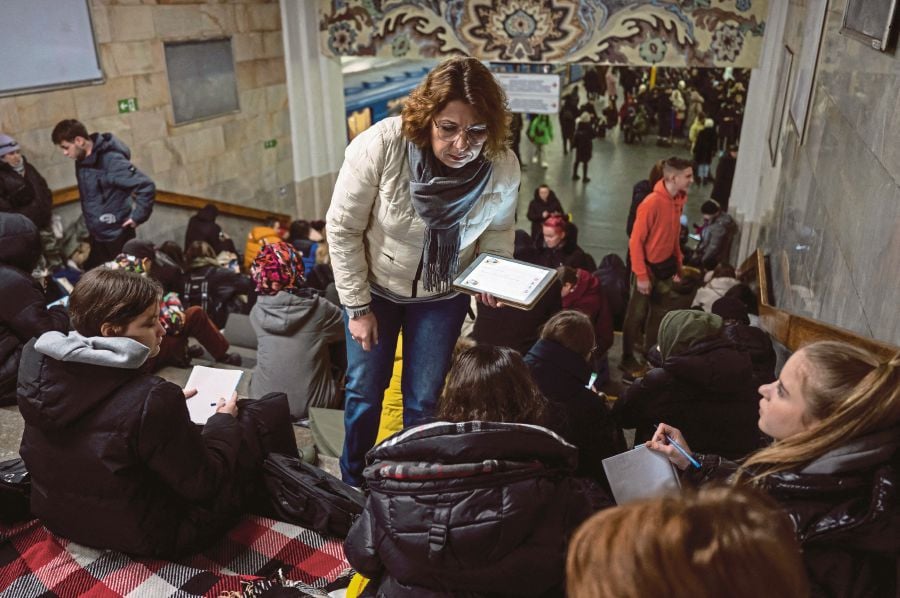As missiles streaked across Kyiv's skies one mid-February morning, a group of high school pupils sat against a metro station's walls, scribbling away in notebooks and focused on their teacher Olena's instructions.
To avoid the lesson being disrupted, she had quickly moved her class underground when the air-raid sirens sounded.
"We teach math, biology, chemistry — everything according to the usual schedule," Olena, who declined to give her last name, told Reuters.
This and similar signs of calm resilience — be it the bars packed despite the threat of missile and drone attacks, or the guides who have adapted city tours to the dictates of war — have become increasingly commonplace in Ukraine's capital.
Nearly a year after it began, Russia's invasion has upended life, but also rallied a nation.
In the days after the Feb 24 assault, much of the city of around three million people sheltered indoors or underground as Ukraine's army fought off Russian troops on land and in the skies.
Tens of thousands of others fled along clogged highways and swarmed onto train platforms.
"Those first days were the hardest," said metro worker Tamara Chayalo, who helped transform the system into a sprawling network of shelters. She didn't go home for three weeks.
Ukraine forced a Russian retreat, but the city has been back under fire since last autumn, when rockets began raining down on infrastructure and other civilian targets, part of what Kyiv says is a Kremlin campaign to break Ukrainians' will.
Russia denies targeting civilians, and says its attacks are designed to weaken Ukraine's military. Amid the howl of air-raid sirens and the hum of generators, residents have learned to press on through power outages.
For city guide, Yulia Bevzenko and her predominantly Ukrainian clients, touring the city's architectural treasures is one way of carrying on under extraordinary circumstances.
On a snowy early February Sunday, her group admired ornate tsarist-era buildings near a city centre park, where a missile strike on Oct 10 marked the start of Russia's campaign of near-weekly attacks.
"Kyiv was always about indulgence, about a sense of leisure," said tour attendee Svitlana Semenets, 56. "But, it has grown muscles, armoured up a bit."
Bevzenko has also tailored her tours to include bomb shelters and with small talk with clients tactfully tweaked, especially after a tragic development, to account for possible changes of mood.
Her business is booming. Last year, she conducted 175 tours, having resumed in April. The collective logic is a matter of "when, if not now?", she says.
That thirst for normality is also a feature of Kyiv nightlife, where revellers flirt with the risk of attacks and an 11pm curfew to enjoy cocktails and concerts.
"People want to live, they want to smile, to be happy," said Daria Kryzh, who co-owns bar and entertainment venue Squat 17b. "Russia will never succeed in taking this away from us."
Events there have also been adjusted to suit the times: entry fees have been replaced by donations for the military, which already exceed US$100,000. Performances and exhibitions are often linked to the war.
Squat 17b's patrons also helped repair a neighbouring museum's windows, blown out in Oct 10 attack.
Kryzh, 35, said the war has spawned a collective strength.
"Everyone has their own little list — how have I changed, how have the people around me changed and what can I do so things get better, so we win quicker?" she said. "These new values have appeared that had never been obvious before."
Chayalo said the common spirit emerged during air strikes when many residents headed underground.
"If people come with small children, other passengers help look after them," she said.
That unity may well be needed as Ukraine appears headed for a long war, marked by attritional clashes like the battle for the eastern city of Bakhmut and by Russia's relentless bombing of Ukrainian infrastructure.
Meanwhile, media reports focus on an anticipated new Russian offensive and billboards offer Ukrainians a constant reminder of sacrifices made by their troops.
At the playground where October's missile hit, Kseniya Bulhakova, 32, plays happily with her son.
But the fear of a new strike is ever present for Ukrainian mothers like herself who are preoccupied with a common thought: "Our children won't be safe until we win."
The writer is from the Reuters news agency
The views expressed in this article are the author's own and do not necessarily reflect those of the New Straits Times


